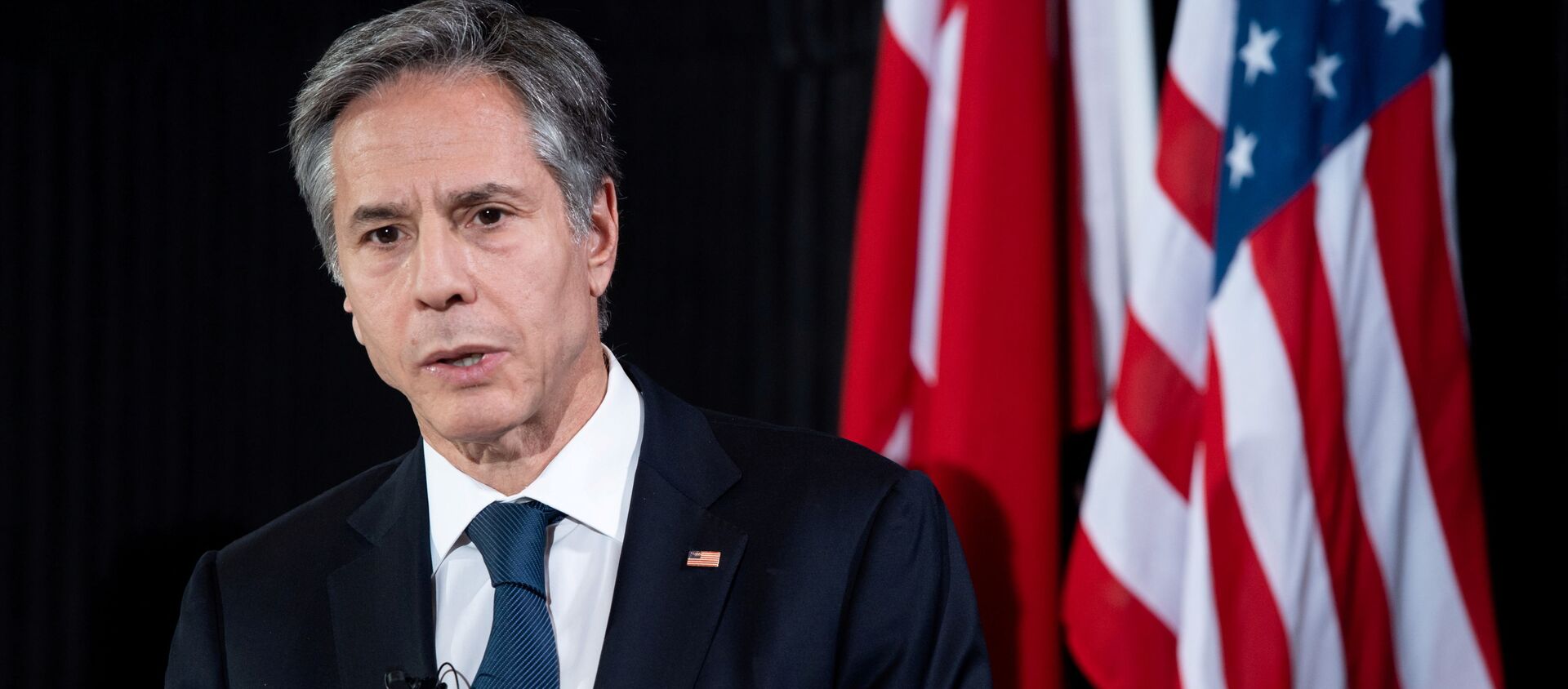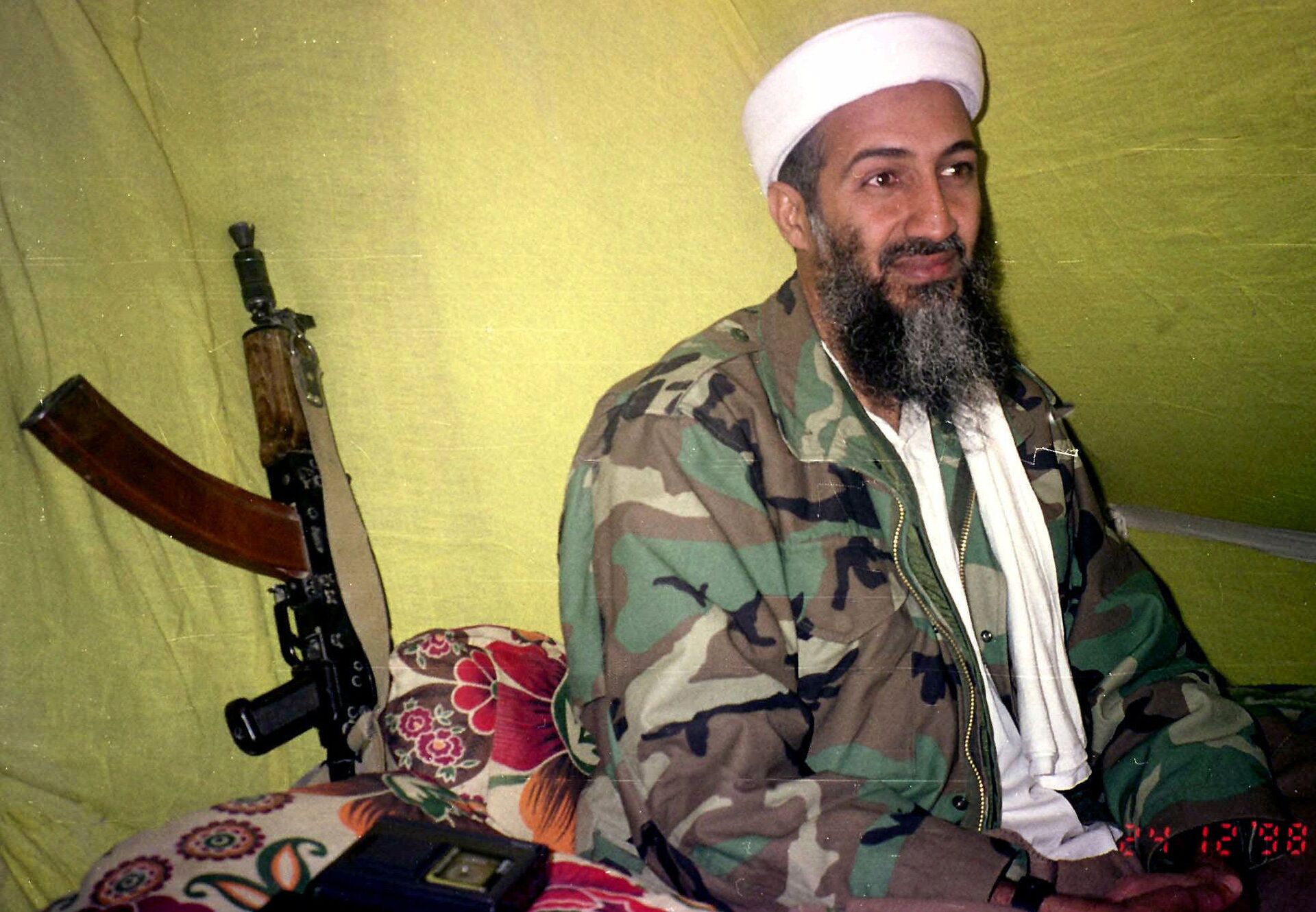https://sputnikglobe.com/20210831/video-allegedly-shows-bin-ladens-security-chief-returning-to-afghanistan-hours-before-us-troop-exit-1083757947.html
Video Allegedly Shows Bin Laden's Security Chief Returning to Afghanistan Hours Before US Troop Exit
Video Allegedly Shows Bin Laden's Security Chief Returning to Afghanistan Hours Before US Troop Exit
Sputnik International
Under the 2020 US-Taliban* peace deal, the militant group pledged that they would not "allow any of its members, other individuals, or groups, including... 31.08.2021, Sputnik International
2021-08-31T09:25+0000
2021-08-31T09:25+0000
2022-10-19T19:40+0000
newsfeed
world
afghanistan
taliban
al-qaeda
osama bin laden
withdrawal
troops
us
video
https://cdn1.img.sputnikglobe.com/img/07e5/08/1f/1083757324_0:20:1427:823_1920x0_80_0_0_3c88b6e165d218498a2948841b605f3c.jpg
Amin ul-Haq, a former security chief of slain al-Qaeda leader Osama bin Laden reportedly reemerged in Afghanistan hours before the completion of the US troop withdrawal from the nation.A video surfaced on Monday purportedly showing Amin ul-Haq, a top al-Qaeda arms supplier, returning to his hometown in Afghanistan's Nangarhar Province. Neither the Pentagon nor the State Department has commented on the matter yet.In the footage, an SUV carrying what looks like ul-Haq is seen driving through a checkpoint amid a small crowd of apparent admirers.At one point, the car stops and the top al-Qaeda associate rolls down the window before the men take turns grasping and kissing ul-Haq's hand. The SUV is then seen being followed by a convoy of vehicles carrying armed militants, with some flying the Taliban's flag.Ul-Haq was a security coordinator for Osama bin Laden's Black Guard in the early 2000s, when the world's most wanted terrorist was occupying the Tora Bora cave complex in eastern Afghanistan.The two reportedly escaped together when US forces attacked the complex at the time, with Ul-Haq detained in Lahore, Pakistan, in 2008. Three years, later, however, he was released because Pakistani officials allegedly could not prove his ties to al-Qaeda, according to US media outlets.On 2 May 2011, US Special Forces raided an al-Qaeda compound in Abbottabad, Pakistan, killing the world's most infamous terrorist as part of Operation Neptune Spear.The raid came almost 10 years after the 9/11 terrorist attacks by al-Qaeda against the United States, which claimed the lives of at least 2,977 people and injured some 6,000 others. The 9/11 attacks led Washington to declare a war on terror, and to the US invasions of Afghanistan and Iraq.*The Taliban and al-Qaeda are terrorist groups banned in Russia and many other countries.
https://sputnikglobe.com/20210822/al-qaeda-not-gone-from-afghanistan-despite-bidens-claims-blinken-1083686717.html
afghanistan
Sputnik International
feedback@sputniknews.com
+74956456601
MIA „Rossiya Segodnya“
2021
Oleg Burunov
https://cdn1.img.sputnikglobe.com/img/07e4/09/0b/1080424846_0:0:2048:2048_100x100_80_0_0_3d7b461f8a98586fa3fe739930816aea.jpg
Oleg Burunov
https://cdn1.img.sputnikglobe.com/img/07e4/09/0b/1080424846_0:0:2048:2048_100x100_80_0_0_3d7b461f8a98586fa3fe739930816aea.jpg
News
en_EN
Sputnik International
feedback@sputniknews.com
+74956456601
MIA „Rossiya Segodnya“
Former Osama bin Laden security aide & AQ arms supplier/facilitator Amin-ul-Haq returns to his hometown after 2 decades on the run, 2 weeks after the Taliban takeover
Sputnik International
Former Osama bin Laden security aide & AQ arms supplier/facilitator Amin-ul-Haq returns to his hometown after 2 decades on the run, 2 weeks after the Taliban takeover
2021-08-31T09:25+0000
true
PT298M21S
Sputnik International
feedback@sputniknews.com
+74956456601
MIA „Rossiya Segodnya“
Oleg Burunov
https://cdn1.img.sputnikglobe.com/img/07e4/09/0b/1080424846_0:0:2048:2048_100x100_80_0_0_3d7b461f8a98586fa3fe739930816aea.jpg
newsfeed, afghanistan, taliban, al-qaeda, osama bin laden, withdrawal, troops, us, video
newsfeed, afghanistan, taliban, al-qaeda, osama bin laden, withdrawal, troops, us, video
Video Allegedly Shows Bin Laden's Security Chief Returning to Afghanistan Hours Before US Troop Exit
09:25 GMT 31.08.2021 (Updated: 19:40 GMT 19.10.2022) Under the 2020 US-Taliban* peace deal, the militant group pledged that they would not "allow any of its members, other individuals, or groups, including al-Qaeda*, to use the soil of Afghanistan to threaten the security of the United States and its allies".
Amin ul-Haq, a former security chief of slain al-Qaeda leader Osama bin Laden reportedly reemerged in Afghanistan hours before
the completion of the US troop withdrawal from the nation.
A video surfaced on Monday purportedly showing Amin ul-Haq, a top al-Qaeda arms supplier, returning to his hometown in Afghanistan's Nangarhar Province. Neither the Pentagon nor the State Department has commented on the matter yet.
In the footage, an SUV carrying what looks like ul-Haq is seen driving through a checkpoint amid a small crowd of apparent admirers.
At one point, the car stops and the top al-Qaeda associate rolls down the window before the men take turns grasping and kissing ul-Haq's hand. The SUV is then seen being followed by a convoy of vehicles carrying armed militants, with some flying the Taliban's flag.
The video emerged after US President Joe Biden argued earlier this month that al-Qaeda is "gone" from Afghanistan. In an apparent sign of contradiction, the president's remarks were followed by Pentagon spokesman John Kirby saying that al-Qaeda's presence in the region isn't "significant enough to merit a threat to our homeland" when compared to the terrorist group's numbers in 2001.
Ul-Haq was a security coordinator for Osama bin Laden's Black Guard in the early 2000s, when the world's most wanted terrorist was occupying the Tora Bora cave complex in eastern Afghanistan.
The two reportedly escaped together when US forces attacked the complex at the time, with Ul-Haq detained in Lahore, Pakistan, in 2008. Three years, later, however, he was released because Pakistani officials allegedly could not prove his ties to al-Qaeda, according to US media outlets.

22 August 2021, 19:12 GMT
On 2 May 2011, US Special Forces raided an al-Qaeda compound in Abbottabad, Pakistan, killing the world's most infamous terrorist as part of Operation Neptune Spear.
The raid came almost 10 years after
the 9/11 terrorist attacks by al-Qaeda against the United States, which claimed the lives of at least 2,977 people and injured some 6,000 others. The 9/11 attacks led Washington to declare a war on terror, and to the US invasions of Afghanistan and Iraq.
*The Taliban and al-Qaeda are terrorist groups banned in Russia and many other countries.




